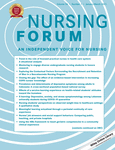Nursing students' perspectives on observed weight bias in healthcare settings: A qualitative study
Abstract
Background
Weight bias continues to be problematic within the healthcare setting among practicing healthcare providers (HCPs). These HCPs serve as influential role models for nursing students when immersed in the clinical environment. However, if HCPs are demonstrating bias toward patients with obesity, this may influence nursing students' beliefs and practices.
Aims
This study aimed to explore nursing students' reflections of observed weight bias within the healthcare setting.
Materials & Methods
A descriptive qualitative study design was used involving reflective journaling and qualitative content analysis. Two cohorts of third-year baccalaureate nursing students (n = 197) participated in weight sensitivity training and submitted reflective journals over one academic semester.
Results
Reports of weight bias were categorized into three themes—(1) Direct Impact: Observed Implicit and Explicit Provider Weight Bias; (2) Indirect Impact: Weight Bias Due to Skills, Equipment, or Staffing/Environmental Deficits; and (3) Reactions toward HCP Weight Bias: Conflict Between Weight Bias Training and Real-World Healthcare Experiences.
Discussion
Weight bias was observed in some HCPs within the healthcare setting. Student reflections explored weight bias and the opposing messages between weight sensitivity training and real-world practices.
Conclusion
Preventing bias through continuing education for HCPs is crucial to provide compassionate care and instill ethical values in the next generation nurses.
CONFLICT OF INTERESTS
The authors declare that there are no conflict of interests.




